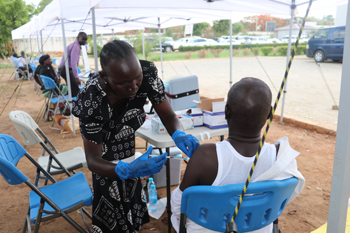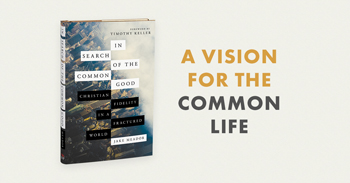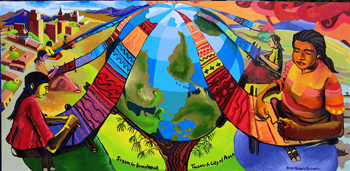Michael Fitzpatrick is a parishioner at St. Mark's Episcopal Church in Palo Alto, CA. After growing up in the rural northwest, he served over five years in the U. S. Army as a Chaplain's Assistant, including two deployments to Iraq. After completing his military service, Michael has done graduate work in literature and philosophy. He is now finishing his PhD at Stanford University.
The past month I’ve been working with my parents to try and get them a COVID-19 vaccine. Both are 65+, but my father in particular is over 70 and has pre-existing conditions. It’s vital they do not wait any longer than necessary without vaccination. About four weeks after their county began the vaccination process, we received word of an outdoor, first-come, first-serve clinic for people 65+ and frontline workers. The clinic was scheduled to begin at 10am in the local fairgrounds. When my parents arrived at 9:30 following an hour drive from their hometown, they discovered more than 900 people already in line before them, exhausting the supply of vaccines the county had on hand.
It’s easy to blame a lack of commitment and leadership by the United States government in producing and administering vaccines. What if we as a nation presently lack the kind of social cohesion and solidarity necessary to coordinate such an awesome enterprise as vaccinating a nation of 330+ million people? Our leaders are only as good as the community they lead. Right now, so-called vaccine hunters scan local medical facilities for unused vaccines that have been discarded for various reasons. While this avoids waste, most vaccine hunters are lower priority persons on the COVID-19 vaccine protocol. Vaccine hunting does not move us closer to adequately providing vaccines for all who should get them first, and it expresses a mentality of each person out for themselves. It’s also risky to self-administer innovative new vaccines.
 |
|
Vaccines offer hope to people around the world.
|
Worse, scammers have started misleading thousands of Americans with promises of pay-for-priority, through false vaccine ads on social media, email, and over the phone. This kind of predatory behavior was widespread long before this pandemic, but it exacerbates an already fraught situation. Perhaps worst of all, certain media personalities have taken to spreading misinformation about the vaccines, taking advantage of the poverty in most people’s medical knowledge. The mRNA vaccines can be unpleasant to receive, because of our body’s strong immune reaction. This is normal and healthy, a sign the vaccine is working correctly. But millions of Americans are now refusing to get the vaccine at all over a confusion about its effects and effectiveness.
The poor vaccine rollout seems to me symptomatic of a deeper condition. When society is organized in such a way that each person feels that they have to fight for their own best interests, even if it comes at the expense of others, it breeds a survival-of-the-fittest approach that subverts our ability to work together for the benefit of everyone. Working for the general welfare is known as serving the common good. In his recent book, In Search of the Common Good: Christian fidelity in a fractured world, author Jake Meador both diagnoses the individualism fracturing American society and explores ways the Christian faith can help us recover a commitment and practice to the common good.
Developing a proposal by sociologist Robert Putnam, Meador suggests thinking about life in a community in terms of “social capital.” This form of capital consists of the “accumulated benefits that come from neighbors knowing one another, caring for one another, and having a variety of opportunities to be neighborly toward each other.” The more people focus on giving to others, the more capital is built up collectively for each of us when we need help. In a healthy society most people are giving for the benefit of others, even as they also depend on the support of others.
How then does a society become unhealthy, a community where most people are focused on their own survival, keeping their own jobs, ensuring their own family has healthcare and affordable housing? A popular answer today is that people suffer the effect of unjust systems and institutions, and there is a lot of truth to this. Meador however explores a more subtle suggestion. The ideas we believe about ourselves, he proposes, shape the way we think and act in the world. Meador believes that a commitment to raising a community’s social capital is directly tied to believing that our lives find part of their meaning and purpose in relationships with that community. Our neighbors, friends, co-workers, and collaborators are seen as essential to our own flourishing, just as we are essential to theirs.
Around the mid-20th century, Meador observes a sort of philosophical change of mood occurring in many western developed societies that followed the ideas promoted by Jean-Paul Sartre, Simone de Beauvoir, and other members of the French existentialist movement. This movement suggested that neither religion nor society can give an individual any meaning or purpose at all. Every individual is an act of their own creation: the task that falls to each of us, they argued, is to free ourselves from all externally imposed cultural and social expectations so that we can define who we want to be. Although this was not a conscious intention, adopting this attitude makes the production of social capital, at best, subordinate to the creation of personal purpose and meaning. The common good can even be seen as the enemy of one’s personal and private well-being.
 |
|
In Search of the Common Good by Jake Meador
|
What does Christian faith have to say to these French existentialists and their ideas of self-creation? For one thing, Meador observes, Christians proclaim that God is love. More specifically, that this God who is love has “acted in the world” to show us what love really means: “[L]ove is dying to yourself so that your beloved may live. To love another person . . . is to will their good, even at cost to yourself.” Meador is describing how Jesus gave his life for us as an act of love. If this is how Christians understand love, then for us it becomes far more important to will the good of another, even at our own cost, than to will the good of ourselves at the cost of another. Christian faith offers a framework of love that orients us towards the common good, in part because we see God as the ground and source of our meaning, rather than our own acts of self-creation. The faithful life is one of living out God’s love for others.
As a kind of tragic irony, a philosophy that was intended to set humans free from the strictures of social bonds and expectations prevents us from living a full life of love. On Sartre’s framework, we’re not free to love as God calls us to love. When religion and culture and politics and even the natural environment are all seen as things that exist outside of us which curtail our individual freedom, we become trapped within ourselves, at war with our world. Meador extends this to issues like climate change. Many people are unwilling to work with their neighbors to be better stewards of our common planet because they see it as a curtailment of their personal and economic freedom. Contrast this with a Christian view of God’s creation as sacramental—physical things that gesture towards something more which makes a claim on our lives. When we see the world and other people as created by a good God, we understand our role in this world to care for those good things, not exploit them for our own benefit.
A Sartrean individualism is being expressed within the COVID-19 pandemic as well. Simple precautionary actions such as wearing masks are taken by some to be an oppressive restriction of their personal freedom. Vaccines become a means for the government to mind control us. The truth is, health professionals are simply trying to help us protect ourselves and our neighbors. I wish more people than me cared about protecting my parents and people like them, so we can better work together as a society to produce and distribute the vaccines they need.
 |
|
A mural in Tuscon, AZ representing the world we hold in common.
|
Meador offers a wide-range of suggestions to recover a life oriented towards the common good, theses about the meaning of work, politics, and relationships. Perhaps most arresting is his observation that “the practice of public worship is an inherently social thing that breaks me out of my natural individualism” by calling together a parish made out of people that each of us might not otherwise choose to associate with. The Church is a community of sinners who depend on each other to grow in Christ through word and sacrament. Perhaps a recovery of the common good can start within the Church, and as part of our missional practice become a gift we bring to our wider communities.
In the state of Massachusetts, public health officials use a digital appointment system for people to receive vaccines. Unfortunately, older generations sometimes struggle with using computers or the internet. These challenges hamper the ability of the most vulnerable to get access to the vaccine. So, an Episcopal church near Boston named St. John the Evangelist has taken up as part of their mission the creation of a COVID-19 Team that assists the local elderly through the process of making appointments and receiving their vaccine. This is the Church at work in society. Too often we depend on government bureaucracy to improve our welfare. Following St. John the Evangelist’s example, maybe the path to grow our social capital is not a government response, but a local one, where we as neighbors decide to meet needs directly through our parishes and volunteer organizations. Becoming a community that exists for the common good starts with setting ourselves free to find our purpose and meaning in the Christ-like service of others.
Michael Fitzpatrick welcomes comments and questions via m.c.fitzpatrick@outlook.com
Image credits: (1) WHO | Regional Office for Africa; (2) Jake Meador; and (3) Treekaya.



